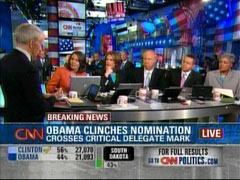Every day, whether we realize it or not, people are exposed to thousands of media messages. These messages, which fight for our attention, can have significant impacts on our thoughts and opinions. Who knows this better than the news media industry? News sources, such as Fox and CNN, compete on a daily basis for the attention of an audience. They habitually attract their viewers through the dramatization and fragmentation of news stories, and even set the agenda for what audiences should be thinking about. So how does all of this affect an audience’s perception of what is going on in the world? Can a voter’s opinion be strongly affected during an election year? Through the use of various articles and studies, this blog explores how the use of agenda-setting, fragmentation, and dramatization in the news media affected voter preference in the 2008 presidential election.
This study is conducted through the Univeristy of Michigans Communications 111 Workshop.
The Universtiy of Michigan- Ann Arbor Communication Department
This study is conducted through the Univeristy of Michigans Communications 111 Workshop.
The Universtiy of Michigan- Ann Arbor Communication Department

